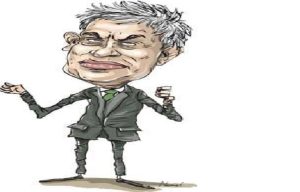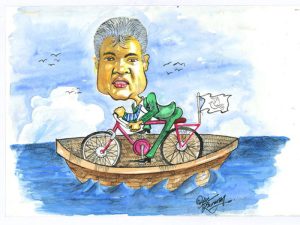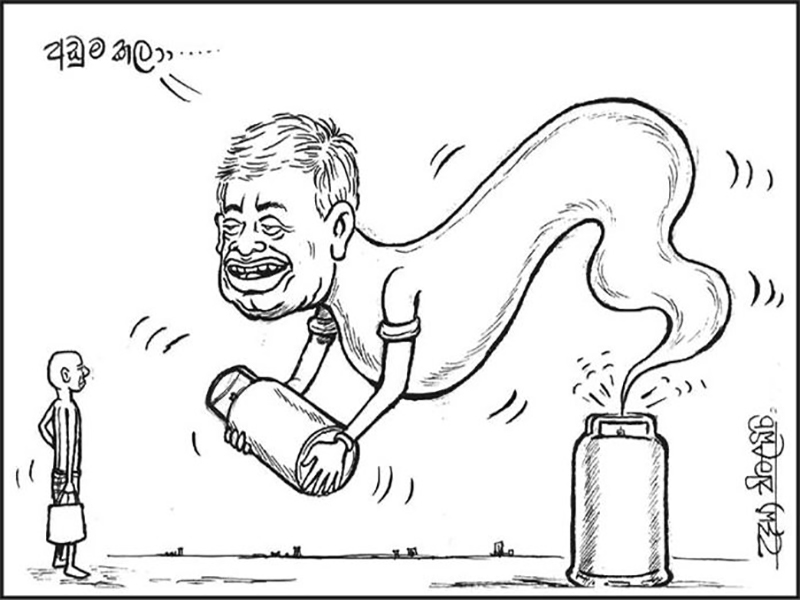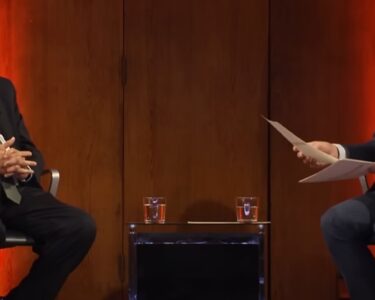As Sri Lanka’s 2024 presidential election approaches, some suggest that President Ranil Wickremesinghe to step down from the race. Many political analysts, including those from within his own camp, are urging him to withdraw, arguing that his continued candidacy could harm the country’s fragile economic recovery and split the vote, leading to potential political instability.

Wickremesinghe, who took over the presidency in 2022, has seen his support grow recently, rising from 9% in February to 23% in July 2024, according to the latest Sri Lanka Opinion Tracker Survey by the Institute for Health Policy (IHP). Despite this increase, he remains far behind the two leading candidates: A.K. Dissanayake of the National People’s Power (NPP) and Sajith Premadasa of the Samagi Jana Balawegaya (SJB). Both are locked in a close race, each with around 37% and 36% of voter support, respectively.
The Argument for Wickremesinghe’s Withdrawal
Critics argue that Wickremesinghe’s candidacy risks dividing the vote, especially among those who want economic stability. His political image remains tied to the old guard, and many voters associate him with the previous regime, which was discredited following the economic collapse in 2022. This perception makes it difficult for him to appeal to the broader electorate, particularly the large bloc of disillusioned voters who supported Gotabaya Rajapaksa in 2019.
Dr. Ravi Rannan-Eliya, the IHP’s polling director, highlighted that Dissanayake has successfully attracted much of the former Gotabaya voter base, especially among younger voters. This group played a key role in the 2019 election but has since become fragmented due to the economic crisis. Whoever can secure the majority of this group’s vote will likely win the 2024 election.
While Wickremesinghe has made some economic progress—stabilizing the country’s finances and avoiding a domestic banking collapse—the economic recovery remains fragile. His supporters argue that continuity in economic policy is crucial to prevent further crises. However, this argument appeals to a small group of voters who understand the complexities of economic reforms, while many others continue to feel the effects of poverty and hardship.

The Risk of Dividing the Vote
Political observers warn that if Wickremesinghe remains in the race, he could draw votes away from Premadasa, the candidate seen as most capable of continuing Wickremesinghe’s economic policies while offering a fresh start politically. Premadasa and his SJB party are seen as the best chance for maintaining stability, as they have experience in government and understand the challenges of running the country.
The fear is that by staying in the race, Wickremesinghe will split the vote among those who want to avoid another crisis, giving Dissanayake, who has a more radical platform, a stronger chance of winning. In such a critical election, many believe the focus should be on ensuring the country’s continued recovery rather than dividing the electorate.
A Call for Leadership
Many political experts are calling on Wickremesinghe to make a difficult but necessary decision. They argue that stepping down would not be a sign of weakness but rather a historic act of leadership, demonstrating his willingness to put the country’s needs ahead of his own political ambitions.
“If Wickremesinghe stays in the race, he risks weakening the chances of economic continuity and stability,” said one political analyst. “Withdrawal would allow the SJB to consolidate the vote and give the country the best chance of avoiding another crisis.”
Even some of Wickremesinghe’s closest supporters have suggested that, if he refuses to withdraw, they should consider shifting their support to Premadasa to prevent a more dramatic shift in the country’s politics.
The Path Forward
While Wickremesinghe has yet to announce any decision, the growing chorus of calls for his withdrawal highlights the stakes of the 2024 election. Sri Lanka’s future depends on avoiding further economic crises, and many believe that a unified approach is the best way forward.
The decision Wickremesinghe makes in the coming weeks could shape not only his political legacy but also the future of the nation. For many, his withdrawal would be seen as an act of leadership that puts the country’s interests first, offering a better chance for stability and recovery







